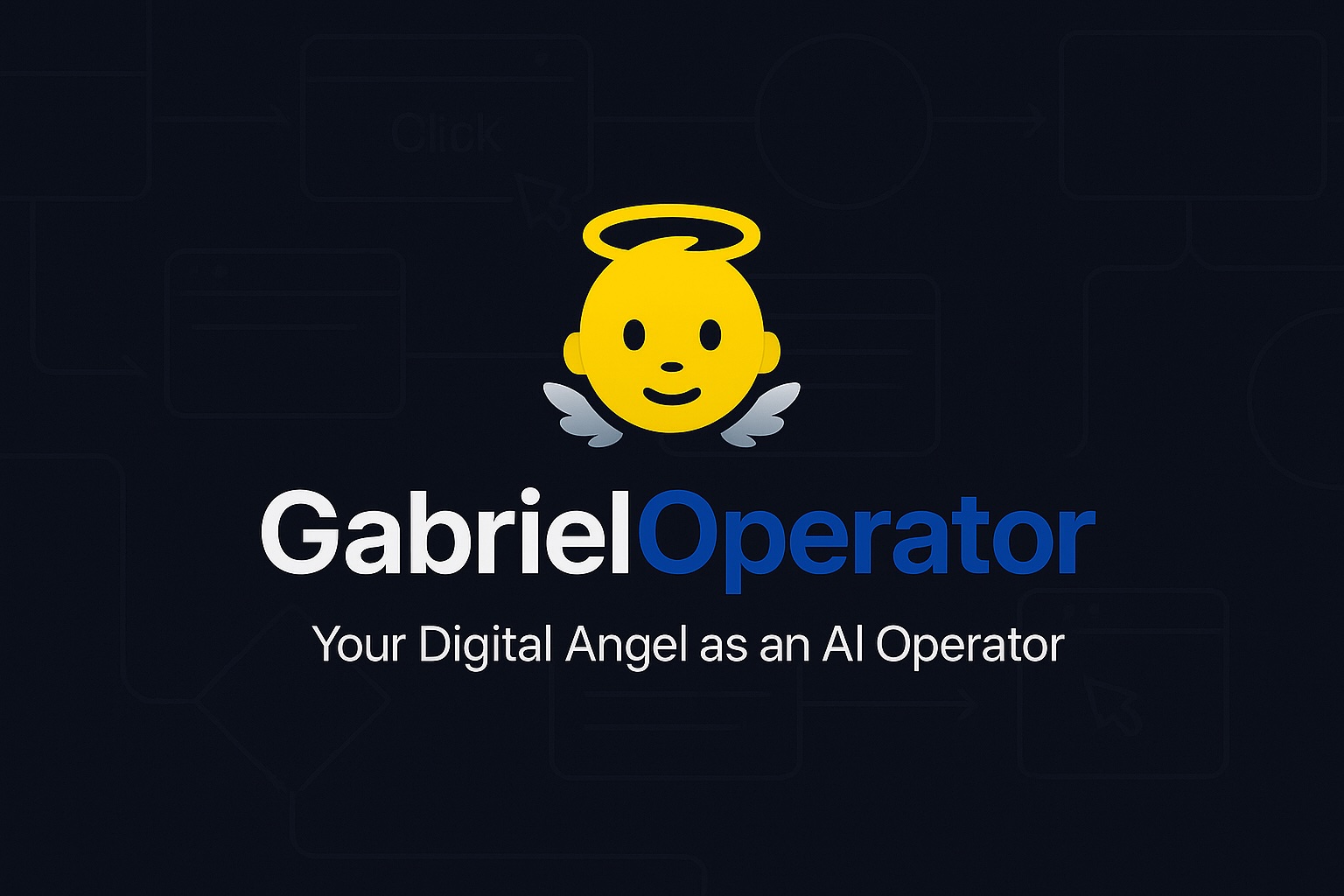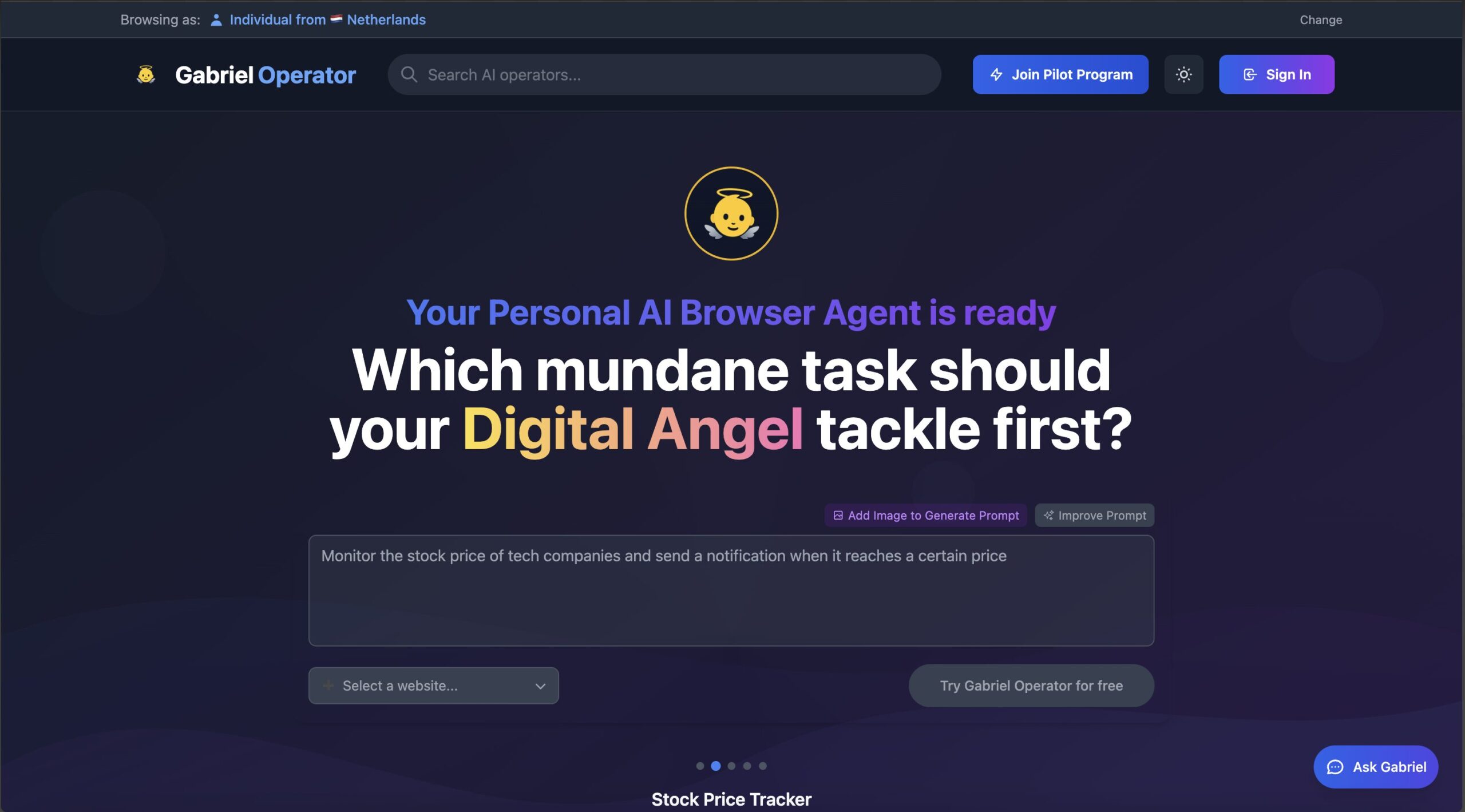
Any website, self-driving in minutes
www.gabrieloperator.com
Table of Contents
Overview
Gabriel Operator represents an emerging browser automation platform that transforms recorded browser actions into intelligent AI agents, positioning itself within the growing no-code automation landscape. Developed in the Netherlands and launched in July 2025, this platform enables users to create automated workflows by simply recording their browser interactions without requiring programming knowledge or complex API integrations.The system converts real-time screen recordings into executable automation scripts that can perform repetitive web tasks such as form filling, data extraction, and login processes. Gabriel Operator differentiates itself from traditional automation tools by utilizing Playwright as its underlying browser automation framework, combined with proprietary AI-driven technology that enables visual recognition and adaptation to changing web interfaces.
The platform is currently in pilot program phase, offering early access to users who want to explore its capabilities for personal and professional automation needs. While the tool shows promise for democratizing web automation, it operates within a competitive market that includes established players with more extensive feature sets and proven track records at enterprise scale.
Key Features
Gabriel Operator incorporates several innovative capabilities designed to make browser automation accessible to non-technical users:- No-code screen recording automation: Records user browser interactions through screen capture technology and converts these programming knowledge, making web automation accessible to users across all technical skill levels.
- AI-powered visual recognition: Utilizes artificial intelligence to identify and interact with web elements based on visual appearance rather than traditional element selectors, enabling the system to adapt to website changes and variations in layout that would typically break conventional automation scripts.
- Playwright-based browser control: Built on Microsoft’s Playwright automation framework, providing robust cross-browser compatibility and advanced browser manipulation capabilities while abstracting the technical complexity from end users through an intuitive visual interface.
- Looping and conditional logic: Supports the creation of sophisticated workflows that can handle repetitive tasks, branch based on conditions, and request user input during execution, enabling more complex automation scenarios beyond simple linear task sequences.
- Browser extension integration: Operates primarily through a Chrome browser extension that facilitates direct interaction with web pages, allowing users to create and manage automations without leaving their browser environment or installing separate desktop applications.
- Creator Mode and marketplace: Features an upcoming Creator Mode that enables users to monetize their automation workflows by sharing them in a community marketplace, creating opportunities for users to generate income from their automation creations while building a library of reusable solutions.
How It Works
Gabriel Operator employs a streamlined three-step process to transform manual browser tasks into automated workflows. Users begin by installing the Chrome browser extension and creating an account through the platform’s web interface. The automation creation process starts with screen recording, where users simply perform their desired browser tasks while the system captures both their actions and the visual context of web elements.The platform’s AI engine analyzes these recordings to understand the sequence of interactions, identify clickable elements, form fields, and navigation patterns. Once the recording is complete, Gabriel Operator’s proprietary technology converts the captured actions into a structured automation script that can be edited and customized through a visual interface. Users can add conditional logic, loops, and input prompts to create more sophisticated workflows that adapt to different scenarios.
The resulting automation agents can be executed on-demand or scheduled to run automatically, with the system handling the browser control and element interaction through the underlying Playwright framework. The platform maintains user control over sensitive operations by allowing automations to pause for human confirmation during critical steps such as logins or financial transactions, ensuring security while maintaining the benefits of automation.
Use Cases
Gabriel Operator’s versatile automation capabilities make it valuable across numerous professional and personal productivity scenarios:- E-commerce and online retail operations: Automate product catalog updates, competitor price monitoring, inventory management tasks, and customer order processing across multiple platforms, enabling small businesses and individual sellers to manage their online presence more efficiently without manual data entry.
- Lead generation and sales automation: Streamline prospecting activities by automating data collection from business directories, social media platforms, and professional networking sites, while also automating follow-up processes and CRM data entry to improve sales team productivity.
- Content management and social media: Automate the process of publishing content across multiple social media platforms, scheduling posts, engaging with followers, and monitoring brand mentions, allowing content creators and marketing professionals to maintain consistent online presence with reduced manual effort.
- Data entry and administrative tasks: Eliminate repetitive form filling, data transfer between systems, report generation, and routine administrative processes that consume valuable time in office environments, enabling knowledge workers to focus on higher-value strategic activities.
- Research and data collection: Automate the gathering of market research data, competitor analysis information, pricing data, and other business intelligence from various online sources, providing businesses with timely insights while reducing the manual effort required for data compilation.
- Financial and accounting processes: Streamline routine financial tasks such as expense report submission, invoice processing, payment verification, and financial data reconciliation across different platforms and accounting systems, improving accuracy and reducing processing time.
Pros \& Cons
Gabriel Operator presents several advantages and limitations that potential users should carefully evaluate:Advantages
- Exceptional ease of use for non-technical users: The screen recording approach eliminates the need for technical knowledge about web elements, CSS selectors, or programming concepts, making automation accessible to business users, entrepreneurs, and professionals without development backgrounds who can benefit from workflow optimization.
- Visual adaptation capabilities: Unlike traditional automation tools that break when websites change their structure, Gabriel Operator’s AI-powered visual recognition can adapt to minor layout changes and continue functioning, reducing maintenance overhead and improving automation reliability over time.
- Rapid automation development: Users can create functional automation workflows in minutes rather than hours or days required by traditional programming approaches, enabling quick iteration and experimentation with different automation strategies to optimize productivity gains.
- Built-in security considerations: The platform’s approach of pausing for human confirmation during sensitive operations provides a balance between automation efficiency and security, ensuring that users maintain control over critical actions while still benefiting from automation of routine tasks.
- Community-driven marketplace potential: The upcoming Creator Mode and marketplace features create opportunities for users to monetize their automation expertise while building a collaborative ecosystem where effective automation solutions can be shared and reused across the user base.
Disadvantages
- Limited to Chrome browser environment: The platform’s dependence on Chrome browser extension architecture restricts its applicability for organizations that primarily use other browsers or require cross-browser automation capabilities, potentially limiting adoption in enterprise environments with diverse browser policies.
- Scalability concerns for enterprise use: As a relatively new platform in pilot phase, Gabriel Operator may lack the robust infrastructure, enterprise-grade security features, compliance certifications, and support structures required for large-scale organizational deployment compared to established automation platforms.
- Potential challenges with complex dynamic content: Websites with heavy JavaScript frameworks, frequently changing layouts, single-page applications, or sophisticated user interfaces may present difficulties for the visual recognition system, potentially requiring fallback to manual intervention more frequently than simpler sites.
- Limited integration ecosystem: Unlike established automation platforms that offer hundreds of pre-built connectors and integrations, Gabriel Operator’s current focus on browser-based automation may limit its ability to integrate with enterprise systems, databases, and specialized business applications without additional development work.
How Does It Compare?
Gabriel Operator enters a competitive landscape of automation tools, each serving different market segments and use cases.UiPath, the market leader in robotic process automation, offers enterprise-grade capabilities with extensive system integrations, advanced error handling, and scalable orchestration features, but requires significant technical expertise and investment, making it more suitable for large organizations with dedicated automation teams.
Microsoft Power Automate provides comprehensive workflow automation across cloud and desktop environments with over 1,000 connectors and deep integration with Microsoft ecosystem products, offering both simple drag-and-drop interfaces and advanced process automation capabilities, though it requires Microsoft licensing and can become complex for sophisticated workflows.
Zapier excels in connecting web applications through its extensive library of over 5,000 app integrations, enabling users to create automated workflows between different services without coding, but focuses primarily on API-based integrations rather than direct browser interaction, limiting its effectiveness for websites without API access.
Bardeen offers browser-based automation with AI-enhanced capabilities and human-in-the-loop interactions, providing a more direct comparison to Gabriel Operator with its Chrome extension approach and focus on browser automation, though it emphasizes pre-built playbooks and AI-powered suggestions rather than screen recording methodology.
Browserflow and Selenium IDE provide no-code browser automation through recording and playback functionality, similar to Gabriel Operator’s core approach, but lack the AI-powered visual recognition and marketplace features that differentiate Gabriel Operator’s value proposition.
Power Automate Desktop offers robotic process automation capabilities for desktop applications with both attended and unattended execution modes, providing broader system automation beyond just browser interactions, though it requires Windows environment and Microsoft ecosystem alignment.
Gabriel Operator’s unique positioning combines the accessibility of screen recording with AI-powered visual recognition and a community marketplace model, potentially offering advantages for small businesses and individual users who need browser automation without the complexity or cost of enterprise solutions, while its success will depend on proving reliability and scalability compared to these established alternatives.
Final Thoughts
Gabriel Operator represents an intriguing approach to democratizing browser automation by eliminating traditional technical barriers through screen recording and AI-powered visual recognition. The platform’s emphasis on user-friendly automation creation, combined with its innovative marketplace model for sharing and monetizing automation workflows, addresses a genuine market need for accessible web automation solutions.The underlying Playwright foundation provides technical credibility, while the Chrome extension delivery method ensures easy adoption for users already working within browser environments. However, the platform’s current early-stage development and limited availability through pilot programs mean that potential users should approach adoption with realistic expectations about feature completeness, reliability, and long-term support.
The competitive landscape includes well-established players with extensive feature sets, enterprise-grade capabilities, and proven track records that may better serve organizations requiring robust, scalable automation solutions. Gabriel Operator’s success will likely depend on its ability to demonstrate consistent reliability across diverse website types, expand beyond Chrome browser limitations, and build the infrastructure necessary to support growing user demands.
For individual users, small businesses, and teams seeking to experiment with browser automation without significant technical investment, Gabriel Operator offers a promising entry point into workflow optimization. However, organizations with complex automation requirements, enterprise security needs, or existing automation infrastructure may find more comprehensive solutions among established alternatives.
As the platform matures and expands its capabilities, it could carve out a meaningful niche in the no-code automation market, particularly if it successfully balances ease of use with the reliability and scalability that professional users require for mission-critical automation workflows.

Any website, self-driving in minutes
www.gabrieloperator.com
